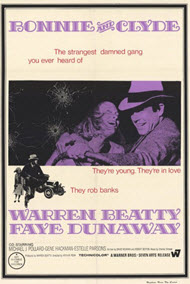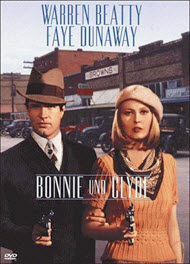Bonnie and Clyde
 for violence.
for violence.
Reviewed by: Brett Willis
CONTRIBUTOR
| Moral Rating: | Very Offensive |
| Moviemaking Quality: |
|
| Primary Audience: | Adults |
| Genre: | Biography Crime Drama |
| Length: | 1 hr. 51 min. |
| Year of Release: | 1967 |
| USA Release: | August 13, 1967 |
| USA Release: |
| Featuring |
|---|
| Warren Beatty, Faye Dunaway, Michael J. Pollard, Gene Hackman, Estelle Parsons, Denver Pyle, Dub Taylor, Evans Evans, Gene Wilder |
| Director |
|
Arthur Penn |
| Producer |
| Distributor |
I was a non-Christian high school senior when I saw this film in its original theatrical release. My friends and I went to see the new heights in realistic violence; we walked out amazed at how we were manipulated to sympathize with cold-blooded murderers and to hate those who brought them to justice.
It’s the 1930s; the Great Depression and the Dust Bowl have devastated the Southwest. Clyde Barrow (Warren Beatty) has just been paroled and is getting ready to resume his life of crime. But first he “picks up” Bonnie Parker (Faye Dunaway) with a promise of excitement, and the famous duo is created. They also take dim-witted C.W. Moss (Michael J. Pollard) into the gang, and are later joined by Clyde’s brother Buck and his wife Blanche (Gene Hackman, Estelle Parsons). The first murder is that of an unarmed bank clerk whom Clyde shoots point-blank in the face. Other scenes of violence include more bank robberies and several shootouts with police.
Warnings: There’s some profanity. There’s no actual on-screen sex, but an early scene of Bonnie and Clyde rolling around on a bed (Bonnie in her slip), without anything happening, seems to go on forever. She tells him it’s OK (the implication is that he’s either gay or impotent). Later, after several murders, Clyde apparently “performs”; we see them afterward, Clyde still awkward and Bonnie reassuring him that he did it just perfect. [I read the following in “Playboy” at the time this film came out: Someone wrote the Playboy Advisor that since he didn’t really want to sleep with his dates, shouldn’t he stick to his guns? The Advisor replied, sure; Warren Beatty proved they could be a substitute for sex.]
In the violence category, I believe this was the first film ever to use bullets-thudding-into-flesh special effects coupled with slow motion. The original rating was “R” (in fact, its release helped to “create” the MPA Rating system); now, the Web sites I’ve checked have no rating listed.
But the most unnerving thing about this film is its creation of artificial sympathy. We all know the traditional film techniques: to create sympathy for someone, do a full character development and show the person as either good or persecuted; to create loathing, show the person as bad; to create indifference, have the person just come out of nowhere. But in this film we are plainly shown that the central characters are evil, yet we feel an enormous pressure to side with them and against the Texas Rangers. I still don’t know exactly how the director did that, but I know it’s dangerous. And I know that the success of this film and “The Graduate”, both of which were unconventional, caused Hollywood to “retool” its previous ho-hum style and continue to use these new techniques in order to capture the youth market.
The main “value” of this film is now historical; it paved the way for the decline of movies to a new, lower standard. It’s over 30 years old, but your teens still shouldn’t watch it. Nor should they watch any other film made after the same pattern; and by now that would include thousands of titles.




